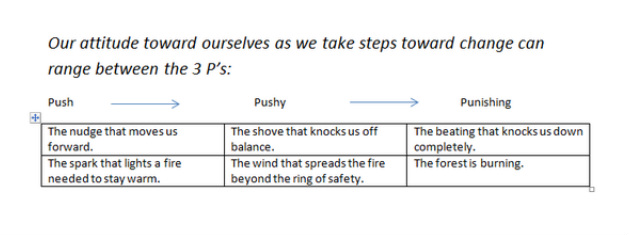|
I've recently been thinking a lot about how positive change occurs and what it takes to reach goals. How is it we shape the life we want to live? I watched the movie Brave last night with my kids and Merida teaches about the importance of knowing ourselves well enough to choose our own paths in life, while still respecting tradition and societal norms around us. It's easy to fall into patterns based on others' expectations or behaviors. For instance... to choose a college because that's where your parents or friends want you to go, or to choose a profession because of the financial reward rather than a true passion. Similarly, we fall into habitual coping patterns based on what we see around us, including the way our parents or significant others cope with things. If our parents screamed and fought, we may find ourselves doing the same thing as adults, even if we don't want to. If our friends use alcohol and drugs to numb life's challenges, we may fall into the same behavior, even though we know the danger. So once these negative coping mechanisms are in place, and lead to more suffering, how does change occur? First, we learn to practice self-compassion. Recognizing when change needs to occur, in order to live our very best life, is a multi-stage process. This awareness itself can be hard to come by. We often adamantly defend our negative ways of coping, or our lack of movement toward long-term goals, with statements like: "This is the only way I know how to do things..." Or "Even though I'm dissatisfied with my job, I'm comfortable there..." Or "Using drugs is the only way to deal with this stress, nothing else works..." Or "Everyone else is wrong, they just don't understand me..." Then, once we get to the awareness that something about us needs to change, we may experience a wave of negative self-talk. There may be guilt and shame about how we've behaved in the past. We may believe our own deficit in character is responsible for our problems, therefore we will always be sub-par, inadequate, and hopelessly flawed. I encourage every client I see to maintain self-compassion and self-acceptance through the counseling process. Even though change may be ideal, the practice of being kind to ourselves in our current state and as we are today will lead to a more fulfilling and pleasant life. Second, it's often tempting to push ourselves too hard. Some pushing is necessary, otherwise we are stuck. But too much pushing is not helpful either. I call this the three P's of the growth process. We can Push ourselves gently to take sometimes difficult but advantageous steps forward. This is the beneficial nudging that moves us to a new and better place in life. But we sometimes will become more insistent on change and become Pushy with ourselves. (We all know the feeling of being on the receiving end of "pushy" behavior from someone else. Is it possible to recognize this behavior in ourselves toward ourselves?) Finally, striving toward change in its most brutal form becomes Punishing, actually causing more harm than good. We may demand change at any cost, and be unable to accept the time it takes to create new habits or thought patterns. Negative self-talk increases. We may starve ourselves or binge eat. We may increase use of drugs or alcohol. We may exercise compulsively.
The goal is to maintain balance between desire for change and acceptance of our present state. Do you think that's possible? Individual counseling can help you find your balance. Comments are closed.
|
AuthorKambria Kennedy-Dominguez, LPC-S |
Phone: 972.755.9120 | Fax: 214.723.5345
533 W. 12th Street Dallas, TX 75208
Privacy Policy Good Faith Estimate
©Flourish Counseling and Consultation PLLC 2024
533 W. 12th Street Dallas, TX 75208
Privacy Policy Good Faith Estimate
©Flourish Counseling and Consultation PLLC 2024



 RSS Feed
RSS Feed
